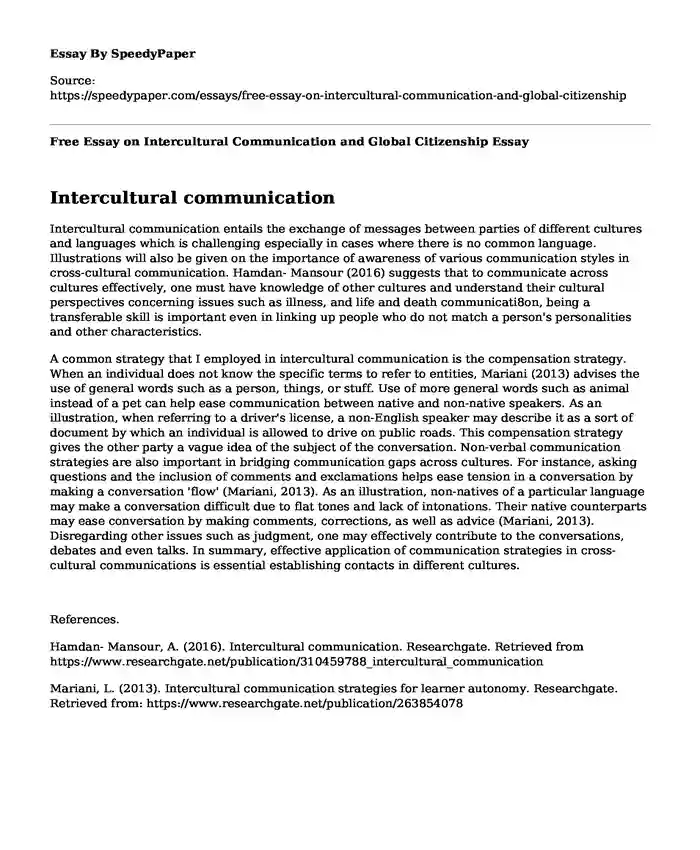
| Type of paper: | Case study |
| Categories: | Globalization Intercultural communication |
| Pages: | 3 |
| Wordcount: | 689 words |
Intercultural communication
Intercultural communication entails the exchange of messages between parties of different cultures and languages which is challenging especially in cases where there is no common language. Illustrations will also be given on the importance of awareness of various communication styles in cross-cultural communication. Hamdan- Mansour (2016) suggests that to communicate across cultures effectively, one must have knowledge of other cultures and understand their cultural perspectives concerning issues such as illness, and life and death communicati8on, being a transferable skill is important even in linking up people who do not match a person's personalities and other characteristics.
A common strategy that I employed in intercultural communication is the compensation strategy. When an individual does not know the specific terms to refer to entities, Mariani (2013) advises the use of general words such as a person, things, or stuff. Use of more general words such as animal instead of a pet can help ease communication between native and non-native speakers. As an illustration, when referring to a driver's license, a non-English speaker may describe it as a sort of document by which an individual is allowed to drive on public roads. This compensation strategy gives the other party a vague idea of the subject of the conversation. Non-verbal communication strategies are also important in bridging communication gaps across cultures. For instance, asking questions and the inclusion of comments and exclamations helps ease tension in a conversation by making a conversation 'flow' (Mariani, 2013). As an illustration, non-natives of a particular language may make a conversation difficult due to flat tones and lack of intonations. Their native counterparts may ease conversation by making comments, corrections, as well as advice (Mariani, 2013). Disregarding other issues such as judgment, one may effectively contribute to the conversations, debates and even talks. In summary, effective application of communication strategies in cross-cultural communications is essential establishing contacts in different cultures.
References.
Hamdan- Mansour, A. (2016). Intercultural communication. Researchgate. Retrieved from https://www.researchgate.net/publication/310459788_intercultural_communication
Mariani, L. (2013). Intercultural communication strategies for learner autonomy. Researchgate. Retrieved from: https://www.researchgate.net/publication/263854078
Global Citizenship
Increased globalization in the past few decades has brought lots of changes in global relations which have positively impacted global economic growth and communication. These changes in the worldwide stage have sparked an interest in citizens who are now more curious about global issues such as climate change, terrorism, food security, and energy. This section of this paper will look at the definition and review some essential concepts of global citizenship.
Global citizenship can be defined as the concept that all people have civic responsibilities that comes with being part of the world. Browes (2017) points out that respect for human rights is. The idea of human rights has been a centre of global focus over the past decades mainly due to the changes in the political and social aspects of the global society (Browes, 2017). Many cases of abuse and violation of human rights have occurred in nations, religious institutions, and organizations among others.
As a result, some declarations and mechanisms have been put in place to curb these shameful occurrences. In my experience, I have seen Global enforcement agencies and courts were established to investigate and rights of all persons in the world irrespective of their cultural backgrounds, social status, or geographical location. These measures and mechanisms protect the Rights of all persons in the world irrespective of their cultural backgrounds, social status, or Geographical location. A democratic institution is another aspect of global citizenship. Follesdal (2014) points out that citizens should respect and trust these institutions as they represent the democratic element in global governance. One of the essential contributions of such institutions is that they safeguard the interests of citizens particularly the interest in non-domination (Follesdal, 2014). Global citizenship has been a topic of construction. And it is not difficult to achieve. Embracing global citizenship and adhering to the mechanisms established ensures world peace and harmonious integration between citizens.
References
Browes, N. (2017). Global Citizenship Concepts in the Curricula of four Countries. IBE-UNESCO and APCEIU.
Follesdal, A. (2014). Global Citizenship. Sense Publisher. Retrieved from http://www.follesdal.net/ms/Follesdal-2014-global-citizenship.pdf
Cite this page
Free Essay on Intercultural Communication and Global Citizenship. (2022, Jul 12). Retrieved from https://speedypaper.com/essays/free-essay-on-intercultural-communication-and-global-citizenship
Request Removal
If you are the original author of this essay and no longer wish to have it published on the SpeedyPaper website, please click below to request its removal:
- Essay Example: Social and Economic Justice in Missouri
- Free Essay: Effects of Divorce and Remarriage in Socio-economic Development in Middle Childhood in the US
- Traditional African Music, Free Essay for Everyone
- Essay Sample Dedicated to Constantine the Great
- Rhetorical Analysis of the Three Narratives, Essay Sample for Students
- Breast Cancer and the Effects It Has on the Patients and Their Families
- Essay Sample on How Companies Learn Secrets
Popular categories




